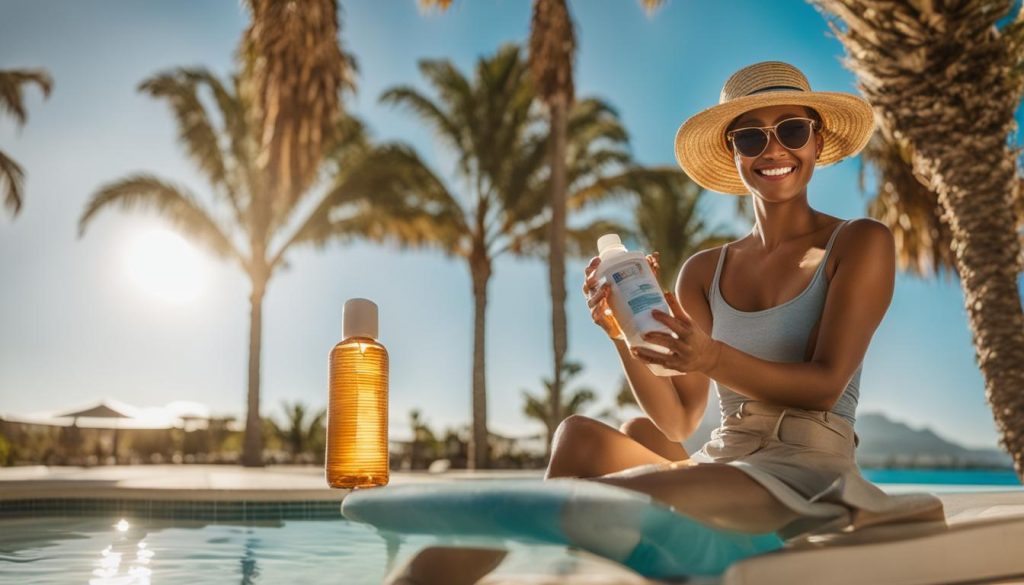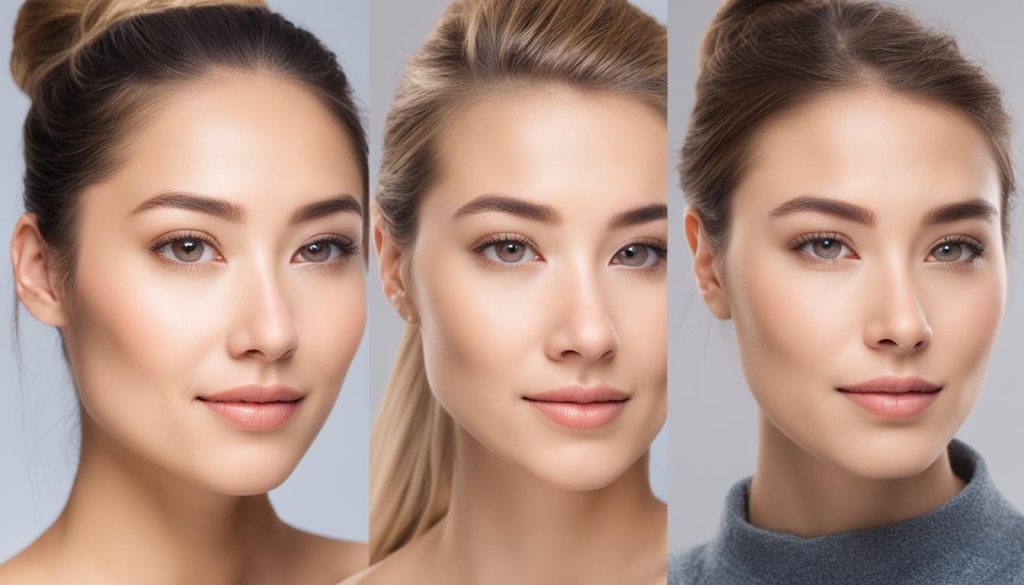As someone dedicated to nurturing my skin, I’ve learned that managing dry skin is about understanding its unique needs and demands. Drawing insights from top dermatologists, I’ve honed in on the gentle dry skin skincare approach that defends the delicate moisture barrier and combats the daily challenges faced by those of us with skin care for dry skin. Finding the best skincare routines for dry skin involves integrating key products that optimize hydration and fortify the skin against environmental stressors.
Sticking to a regimen rich in moisture-preserving tactics is not just a luxury—it’s a necessity. In this guide, I’ll share with you my tried-and-true dry skin care tips and dry skin remedies at home that have proven effective in soothing my thirsty complexion. Let’s dive into a skincare journey that promises plump, soft, and radiant outcomes, proving that dry skin need not be a lifelong struggle.
Dry Skin Skincare Tips
- Embrace a skincare routine tailored specifically to preserve the moisture of dry skin.
- Utilize hydrating cleansers and moisturizers that are kind to your skin’s delicate barrier.
- Incorporate products with hyaluronic acid and vitamin C for enhanced hydration and protection.
- Always apply sunscreen with SPF 30 or higher to protect against UV rays and prevent further drying.
- Adopt nighttime skincare rituals that employ heavier creams to lock in moisture as you sleep.
- Consider home remedies and supplements that complement your routine and contribute to overall skin health.
Understanding the Basics of Dry Skin
As I delve into the realm of dry skin, I recognize the urgency in addressing this widespread concern, which affects countless individuals. The quest for a hydrating skincare routine and the best skincare for dry skin has never been more pertinent. Before exploring the strategies to nourish and protect, let’s consider the underlying factors of this condition.
What Causes Dry Skin and its Consequences
My investigation into dry skin reveals a host of contributors including harsh weather, genetics, and underlying health issues—all leading to depleted moisture levels in the skin. The analogy of a sponge left in the sun encapsulates the sensation of tightness, flakiness, and discomfort experienced by those afflicted. Recognizing these symptoms begs the adoption of a moisturizing skincare routine designed to combat the skin’s dehydration.
Insights from Dermatologist Joshua Zeichner on Dry Skin
Dr. Joshua Zeichner’s expertise illuminates the path ahead, as he explains the skin’s compromised ability to act as a barrier when parched, paving the way for the vexing micro-fissures. His guidance underscores the need for an effective dry skin skincare routine that focuses on preventing further moisture loss and reinforces the skin’s defense system against harsh environmental irritants.
The Importance of Maintaining Skin Hydration
In championing the journey to supple skin, I’ve gleaned that the cornerstone of a nourishing skincare routine for dry skin is an unwavering commitment to hydration. An arsenal of products rich in emollients and humectants must be called upon to forge a robust moisture-locking shield. Prioritizing hydrating skincare routines is not merely a cosmetic preference but a fundamental aspect of maintaining a healthy skin barrier and overall dermatological wellbeing.
- Employing a gentle cleanser that doesn’t strip the skin’s natural oils.
- Layering moisturizing skincare products with ingredients such as hyaluronic acid.
- Sealing in hydration with a rich, occlusive cream at night.
Armed with this blueprint, we stand well-poised to resist the challenges of dry skin, ushering in an era of optimal skin health and comfort.
The Ultimate Morning Dry Skin Skincare Routine
My commitment to maintaining healthy, radiant skin despite its tendency to dryness begins each morning with a dry skincare routine. Understanding the delicate nature of my skin, I ensure to carefully select hydrating skincare products that effectively nourish without disrupting my skin’s natural balance. In the spirit of sharing, allow me to guide you through what I consider an optimal skin routine for dry skin.

Firstly, I embrace the day with a gentle, non-foaming cleanser. It’s crucial for preserving my skin’s essential oils, which are indispensable for my day-long comfort and skin health. Upon cleansing, I immediately cater to my skin’s thirst by deploying a vitamin C serum, which not only imbues my skin with radiance but also serves as an antioxidant shield. Following this, hyaluronic acid is a must – it’s like a cool morning quench that plumps my skin with moisture.
- Commence with a gentle, non-foaming cleanser.
- Apply a vitamin C serum for its brightening and protective properties.
- Finesse with a layer of hyaluronic acid for deep hydration.
When stepping outside, protecting my skin from harmful UV rays without compromising on hydration is non-negotiable. Thus, my regimen includes a pivotal step where I apply a moisturizing sunscreen with an SPF of at least 30. As an additional tip for those suffering from extra dry skin, layering a nourishing moisturizer beneath your sunscreen can offer that extra safeguard and comfort.
- Sunscreen with SPF 30 or higher is a must for UV protection.
- Consider a second layer of moisturizer for enhanced dry skin defense.
Consistency is key. By adhering to this dry skin care routine day after day, I have noticed a considerable improvement in my skin’s hydration levels and resilience against environmental stressors. Whether you’re new to the realm of skincare or seeking to refine your existing regimen, incorporating these dry skin tips can make a profound difference in the health and appearance of your skin.
Selecting the Right Moisturizers for Dry Skin
As someone personally invested in maintaining healthy skin, I’ve learned that the cornerstone of the best skin care routine for dry skin is choosing the ideal dry skin moisturizer. The variety of products on the market can be overwhelming, but understanding the role of specific ingredients can help tailor a dry skin treatment that genuinely works. It’s not just about combating dryness – it’s about nurturing the skin’s delicate balance and fortifying its natural defenses.
Ingredients to Look For in Moisturizing Products
In my exploration of natural skincare for dry skin, I’ve pinpointed a trio of essential components that any effective moisturizer must contain—attracting moisture, locking it in, and repairing the skin barrier. These are the building blocks of hydration that can turn tight and parched skin into a hydrated canvas glowing with health.
- Emollients: These are your skin’s softening allies, with ingredients like shea butter and jojoba oil improving texture instantly.
- Humectants: Stars like glycerin and hyaluronic acid aren’t just hype; they draw moisture in, elevating the hydration levels of the skin.
- Occlusives: To seal the deal, look for beeswax or lanolin, which form a barrier to prevent precious water loss during long, dry spells.
Board-Certified Dermatologist Corey L. Hartman’s Expertise on Moisturization
Dermatologist Corey L. Hartman emphasizes that a sum is more significant than its parts, as a well-formulated moisturizer can transform the skin’s surface. The combination and the quality of the emollients, humectants, and occlusives can mean the difference between a so-so outcome and achieving the pinnacle of skincare success, especially for those of us with chronically dry skin.
Understanding Emollients, Humectants, and Occlusives
My nighttime regimen is non-negotiable, and a rich, restorative cream that capitalizes on the synergistic effect of emollients, humectants, and occlusives has made all the difference. There’s something incredibly comforting about ending the day by nourishing my skin with a formulation that doesn’t just sit on the surface but dives deep to deliver lasting hydration – the ideal dry skin treatment as I dream away.
Sun Protection and Dry Skin Prevention
As someone deeply invested in my dry skin skincare regime, I understand the immense value of integrating sun protection into my daily routine. Relying on the expertise of dermatologists like Joshua Zeichner, I’ve come to recognize the necessity of using an SPF 30 moisturizer, regardless of the season or weather conditions. UV protection isn’t merely a precaution; it’s a pivotal element in my best hydrating skincare routine to thwart the premature signs of aging and maintain my skin’s health.

Undeniably, one of the essential dry skin tips I’ve adopted is to generously reapply sunscreen every two hours, especially if I’m outdoors. This practice not only serves as an armor against the ultraviolet assault but also ensures that my skin’s hydration is effectively sealed in. Coupled with natural remedies for dry skin, such as aloe vera applications after sun exposure, I’ve found my skin to be more resilient to environmental stressors.
Here’s a breakdown of my dry skin care routine with a focus on UV defense:
- Apply a broad-spectrum SPF 30 moisturizer in the morning after a hydrating serum.
- Carry a travel-sized sunscreen for handy reapplication throughout the day.
- Incorporate a protective lip balm with SPF to cover all exposed areas.
- Utilize UV-protective accessories like hats and sunglasses for added barriers.
- Seek shade whenever possible, particularly during peak sun hours.
By making these practices habitual, I am confident that my skin is not only safeguarded against the sun’s rays but also in retaining its moisture balance, all of which contribute substantially to a best hydrating skincare routine. Remember, preventive measures today lead to a healthier, more radiant complexion tomorrow.
Natural Remedies and Hydration Tips for Dry Skin
As someone deeply invested in enhancing my skin’s health naturally, I’ve explored an array of natural remedies for dry skin and developed a hydrating skincare routine that takes advantage of earth’s bounties. Renowned dermatologists, including Lian Mack, recommend simple yet effective natural ingredients that offer profound hydrating properties, which can be easily integrated into daily skincare practices.
The Effectiveness of Natural Hydrating Ingredients
Finding the best skincare for dry skin can often be a journey back to nature. Powerhouses like hyaluronic acid and glycerin, which my skin loves, have the incredible ability to draw moisture into the skin and lock it in place. But natural skincare for dry skin doesn’t stop there. Oils rich in fatty acids, such as argan oil, and soothing elements like aloe vera bring comfort and repair to my parched skin.
DIY Dry Skin Remedies at Home
- Aloe Vera: I apply pure aloe vera gel to soothe and moisturize my skin.
- Argan Oil: A few drops of argan oil before bed provide my skin with essential nutrients and hydration.
- Shea Butter: This nutrient-rich butter is my go-to for deep moisture, especially on areas like elbows and heels.
- Oatmeal Bath: For overall relief, I soak in an oatmeal bath that leaves my skin feeling supple and nourished.
Guidance from Dermatologist Lian Mack on Natural Skincare
Dermatologist Lian Mack emphasizes the significance of applying moisturizer on damp skin to seal in hydration, a tip that has become a game-changer for my dry skin remedies at home. Integrating a hydrating sheet mask into my weekly regimen gives my skin an extra hydration boost it often craves.
Beyond topical treatments, I’ve learned that a holistic approach is key. Ensuring my room has enough moisture by using a humidifier, especially during dry winter months, and keeping myself well-hydrated, directly reflects on the health of my skin. These practices complement my quest for effective natural skincare for dry skin, helping me maintain a dewy and glowing complexion all year round.
Constructing the Perfect Night-Time Skincare Routine
As someone deeply invested in maintaining optimal skin health, I find that a night-time skincare routine is the backbone of a comprehensive approach to managing dry skin. In my experience, the touchstone of evening care begins with gentle cleansing, essential for removing the day’s accumulation without stripping precious moisture. I rely on cleansing balms or micellar water, which perform effectively while preserving my skin’s delicate balance. Once my skin is cleansed, I focus on layering intensely hydrating serums and creams. These products aren’t merely moisturizing—they’re pivotal in boosting my skin’s overnight repair and reinforcing its barrier functions.
In crafting the best skincare routines for dry skin, I’ve learned that moderation is key, especially in the domain of exfoliation and active ingredients. My regimen sidesteps over-exfoliation by incorporating gentle, periodic use of such products, ensuring that I avoid causing additional stress or irritation. I’ve also embraced a strategy recommended by dermatologists, such as Corey L. Hartman, known as the “retinol sandwich”. This technique combines retinol application with hydrating serums, optimizing the benefits of retinol while enveloping my skin in layers of hydration that aid in combating dryness and irritation. Adhering to this advice has been transformative in maintaining my skin’s moisture levels throughout the night.
Ultimately, my quest for an effective dry skin care routine converges on nocturnal practices that optimize skin’s recovery and resilience. It’s a ritual now—a commitment to using moisturizing skincare products that ensure when I wake, my skin exudes a hydrated, healthy glow. A well-devised night-time regimen equals a fortified skin barrier, ready to confront a new day. This is the essence of my personal care narrative—investing in the silent, regenerative hours of night that prepare my skin to face the world with confidence.
FAQ
What are gentle skincare solutions for dry skin?
Gentle skincare solutions for dry skin include using a non-foaming, hydrating cleanser to avoid stripping the skin of natural oils. After cleansing, apply a vitamin C serum for antioxidant protection followed by a hyaluronic acid serum for hydration. Utilize a heavy cream-based moisturizer at night to lock in hydration, and always use products formulated for sensitive or dry skin types.
What causes dry skin and what are its effects?
Dry skin occurs due to a lack of moisture in the stratum corneum, the skin’s outermost layer. Causes can vary from environmental factors, such as cold weather and indoor heating, to genetics and age. Dry skin can feel tight, appear flaky, and become itchy. Proper skincare routines can help to alleviate these symptoms by maintaining the skin’s moisture barrier.
What does dermatologist Joshua Zeichner say about dry skin?
Dermatologist Joshua Zeichner notes that dry skin cannot effectively protect itself from environmental factors, leading to tiny cracks in the skin’s surface that impair its ability to maintain hydration. To manage dry skin, he recommends a skincare routine that focuses on hydration and protection with the use of appropriate moisturizers and sunscreens.
Why is maintaining skin hydration important?
Maintaining skin hydration is essential to keep the skin healthy, supple, and resilient. Hydrated skin can effectively serve as a barrier against environmental aggressors, reducing the incidence of irritation, flakiness, and premature signs of aging. Hydration also helps in skin repair and maintaining a smooth, glowing complexion.
What should a morning skincare routine for dry skin include?
A morning skincare routine for dry skin should start with a gentle cleanser followed by moisturizing products. Apply a vitamin C serum to protect the skin from free radicals, then a hyaluronic acid serum to hydrate. Finish with a moisturizer containing SPF 30 or higher to moisturize and protect skin from UV damage.
Which ingredients should you look for in moisturizers if you have dry skin?
Look for moisturizers that contain emollients (like shea butter and petrolatum), humectants (like glycerin and hyaluronic acid), and occlusives (like dimethicone and lanolin). These ingredients work together to hydrate the skin, prevent moisture loss, and repair the skin barrier.
What advice does dermatologist Corey L. Hartman have regarding moisturization for dry skin?
Board-Certified Dermatologist Corey L. Hartman suggests using products that combine emollients, humectants, and occlusives for an effective dry skin moisturization strategy. This includes applying a heavier cream at night to reinforce the skin’s moisture barrier and aid in the skin’s natural repair processes.
How do sun protection and dry skin prevention correlate?
Sun protection is critical as UV radiation can exacerbate dry skin and lead to premature aging. Dry skin is more susceptible to UV damage, making it vital to use a broad-spectrum sunscreen with at least SPF 30 daily to prevent further moisture loss and shield the skin from harmful rays.
What are some DIY dry skin remedies that you can make at home?
DIY remedies for dry skin include using natural ingredients such as honey, yogurt, avocado, and oatmeal to create moisturizing masks. Aloe vera gel is excellent for soothing and hydrating, while oils like olive oil, coconut oil, and argan oil can be applied to moisturize the skin deeply.
What natural ingredients are recommended by dermatologist Lian Mack for hydrating dry skin?
Dermatologist Lian Mack recommends natural hydrating ingredients like aloe vera, which calms and moisturizes the skin, and argan oil, rich in Vitamin E and fatty acids. Hyaluronic acid and glycerin are also suggested for their ability to attract and retain moisture in the skin.
How should you construct a perfect night-time skincare routine for dry skin?
A perfect night-time routine for dry skin should involve a gentle cleansing to remove impurities without over-drying, followed by application of hydrating serums and a heavy night cream that includes emollients, humectants, and occlusives. Additionally, it’s advised to avoid harsh exfoliants and to incorporate a retinol product cautiously, if suitable, to ensure effective treatment without irritating the dry skin.






